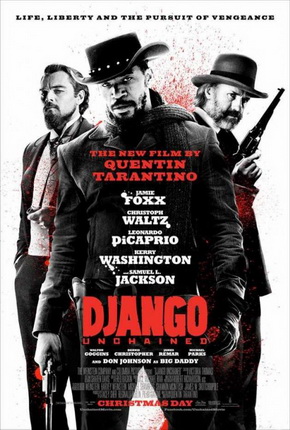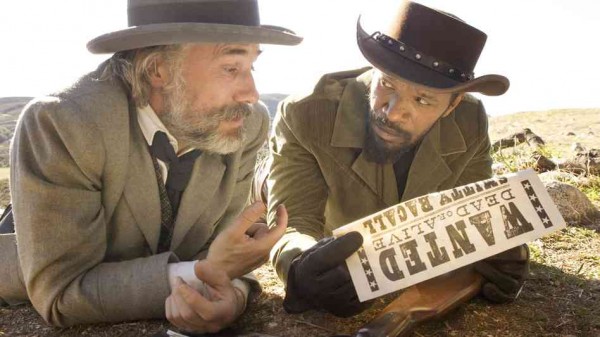
Quentin Tarantino requires no introduction. He is not a great actor, as his brief cameo in Django Unchained shows, but a talented director with a very distinct style of storytelling. His preference for visceral violence in movies has often be the focal point of discussion. However, the bottom-line is that these are simply the kind of movies he likes to make, and Tarantino fans know and respect this. Three years after the critically acclaimed Inglourious Basterds, for which Christoph Waltz won a best supporting actor Oscar, Tarantino is back with a new story. This time he centers on slavery in America in the western Django Unchained.
The movie begins with, as the title implies, the unchaining of Django: a slave, by the intellectual German bounty hunter Dr. King Schultz. Schultz knows the names of three men he is after, but not their faces. Django does: he used to be enslaved by them, and hence Schultz frees and recruits him to complete his quest, promising him a share of the bounty. Jamie Foxx plays a fitful Django and Christoph Waltz a high-spirited Schultz, a performance which may well earn him a deserved second Oscar. Waltz’s character is especially likable, as he is morally superior to the slave owners the two of them visit. After they complete their first bounty together, the movie shifts towards a different quest: that of finding and freeing Django’s wife: Broomhilda von Shaft. After some detours, the two end up at Broomhilda’s owner: the eccentric Calvin Candie, excellently portrayed by Leonardo DiCaprio, at his not so sweet Candieland.
Django Unchained is primarily about two men that go on a journey together in a cruel nineteenth century America. Indeed, even though the film starts off in a light tone, Tarantino does not romanticize the brutishness of the slave owners and in more than one way this movie is about vengeance for slavery and oppression. While some of the violence, mostly that which involves gunfights and explosions, is comical due to the absurd depiction of blood and rag-doll physics, there are also scenes which are gruesome, particularly one where a slave is torn apart by dogs and flashbacks to that moment. To the movie’s credit: this does manage to get a more serious tone across, and underscores the insanity of the slave’s owner. Furthermore, the stark differences in moral stance between slaves are also emphasized in various ways throughout the film: not just the slave owners are the bad guys.
Tarantino’s latest film is no less violent than his others, uses the n-word an awful lot, and is lengthy at 165 minutes. Whether any of that is a problem is largely a matter of personal taste for the viewer, as it was for the filmmaker. Do not be deceived, Django is a thoroughly enjoyable movie, with lots of memorable hilarious moments, little twists, and a satisfying ending. If you like this type of storytelling, then you should go and watch it and witness some great cinema. And … if this review garnered your curiosity, perhaps the trailer below will get your attention.
★★★★★★★★☆☆

